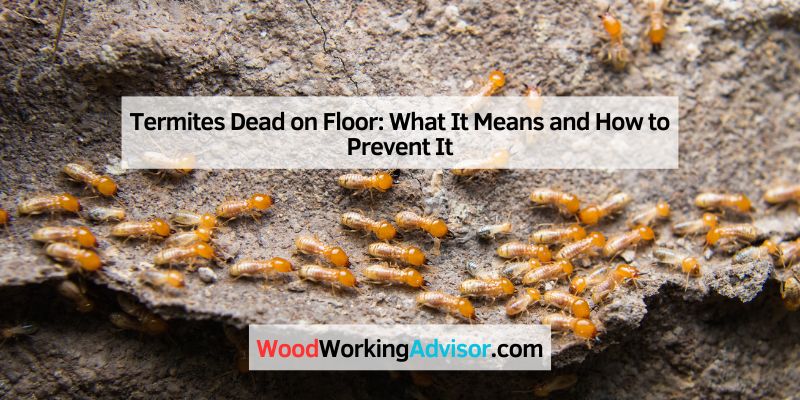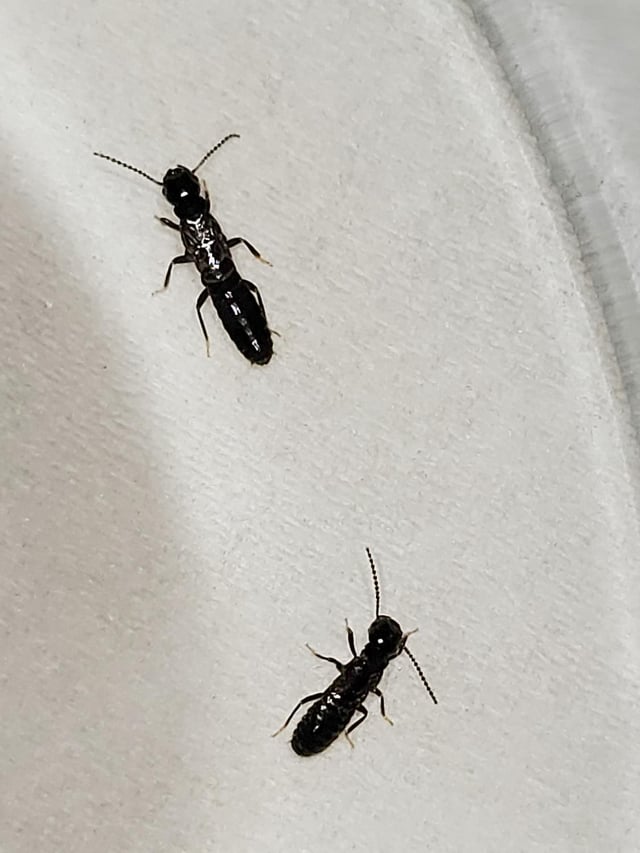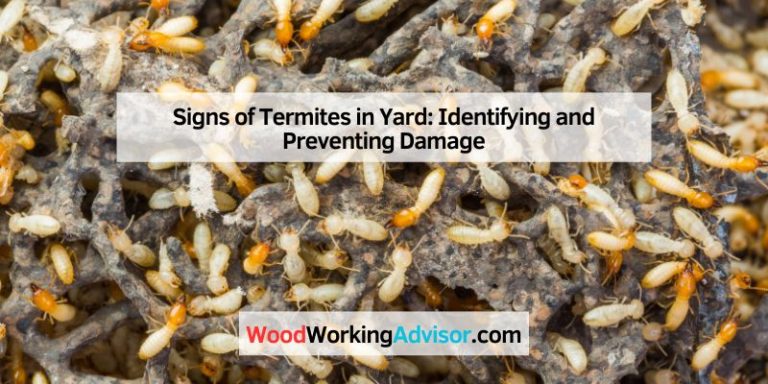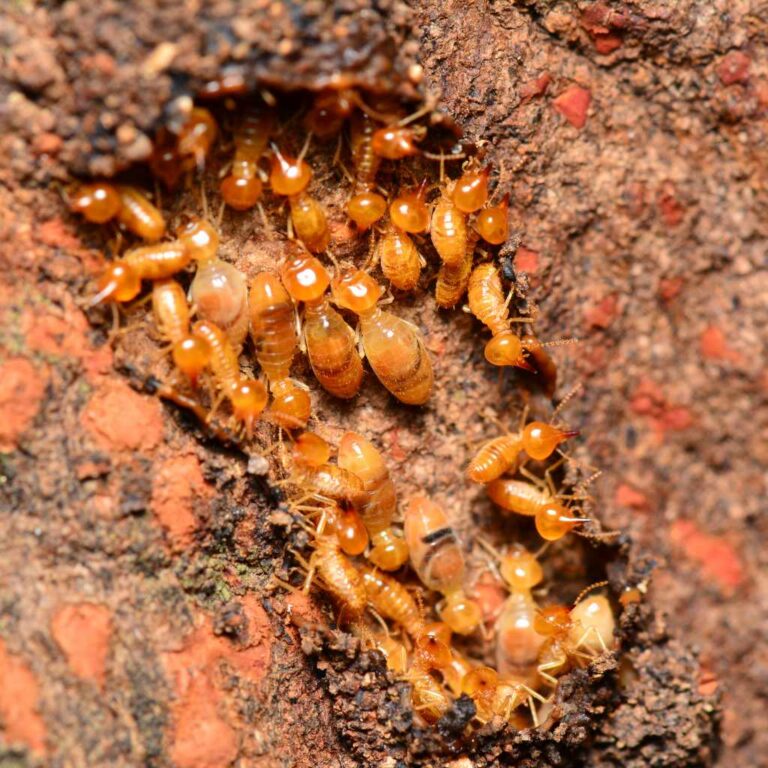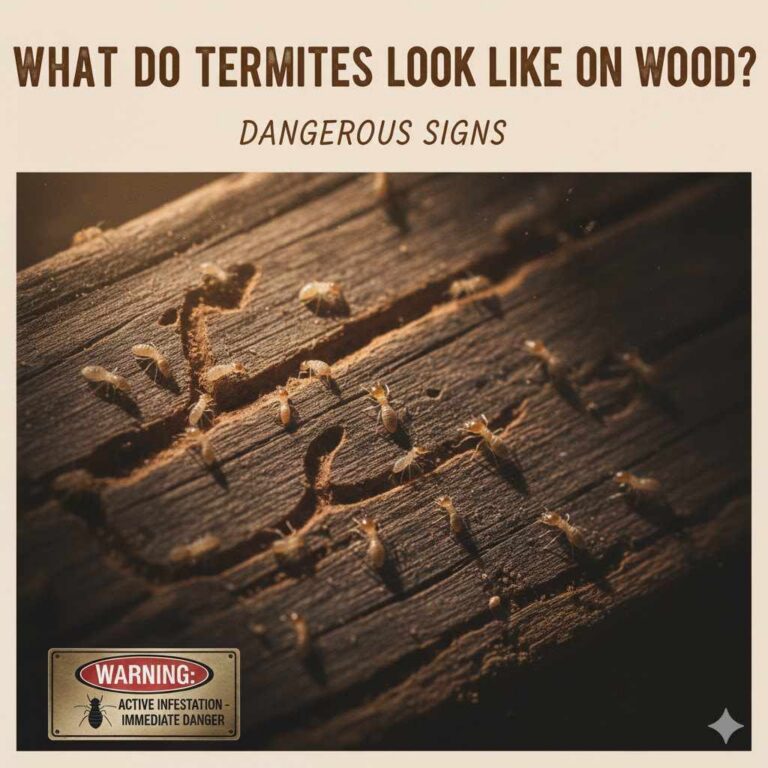Termites Dead on Floor: What It Means and How to Prevent It
Finding termites dead on the floor can be confusing and worrisome. You might wonder what caused it and if there’s a bigger problem.
Termites are small, but they can cause big damage to homes. Seeing dead termites might seem like good news, but it often signals a larger infestation. This introduction will help you understand why you find termites dead on the floor.
It will also guide you on what steps to take next. Knowing the signs and reasons behind dead termites can save your home from potential harm. Stay with us to learn more about this important issue and how to handle it effectively.
Signs Of Termite Infestation
Hey friends, today we’re diving into a topic that might make your skin crawl – termites. These tiny pests can cause a lot of damage to your home if left unchecked. So, how do you know if you have a termite problem? Let’s look at some signs.
Dead Termites
You may notice dead termites on your floor. This is a clear sign that you have a termite infestation. These dead insects might be found near windows, doors, or other entry points. Why are they dead? They could have come into contact with insecticides or natural predators.
Seeing dead termites is a bad sign. It means there are living termites nearby. The living ones are likely causing damage to your home. So, if you see dead termites, it’s time to take action.
Other Indicators
Dead termites aren’t the only sign of a problem. Here are other indicators:
- Droppings: Termite droppings look like small wood-colored pellets. If you find these, termites are nearby.
- Hollow wood: Tap on your wood. Does it sound hollow? That’s because from the inside out.
- Mud tubes: Termites build small tunnels to travel and protect themselves. These are often found near the foundation of your home.
- Winged termites: Sometimes, termites with wings swarm. If you see these, it’s a sign they are looking to create a new colony.
Let me share a quick story. I recently visited a friend who thought she just had a few ants. But, when we looked closer, we found dead termites. We also noticed droppings and hollow wood. She called a pest control service immediately. The good news? They were able to stop the infestation before it got worse.
So, if you notice any of these signs, don’t wait. Take action quickly to protect your home. Termites can cause serious damage, but the quicker you act, the easier it is to control them.
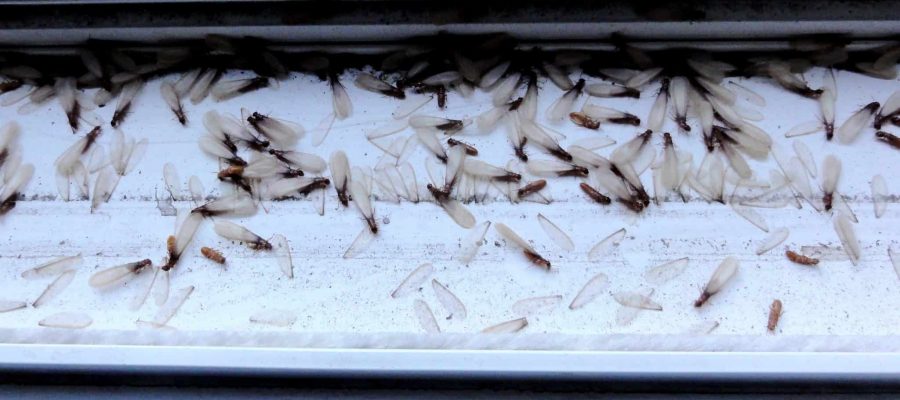
Credit: safeguardpestcontrol.com.au
Why Termites Die Indoors
Termites inside your home can be a frustrating issue. Finding termites dead on the floor raises questions about their demise. Understanding why termites die indoors can help address the problem effectively.
Environmental Factors
Termites thrive in specific conditions. Indoors, they face different environments. Changes in humidity and temperature can stress them. A lack of moisture can be fatal. Termites rely on moisture to survive. Dry indoor conditions can lead to dehydration. This can cause them to die on your floor.
Pesticide Exposure
Pesticides are another reason termites die indoors. Many homeowners use pesticides to control infestations. These chemicals target termites directly. Exposure to pesticides can kill termites quickly. Dead termites on the floor may indicate a recent treatment. Regular pesticide use can reduce termite populations. Ensure you follow safety guidelines when using these chemicals.
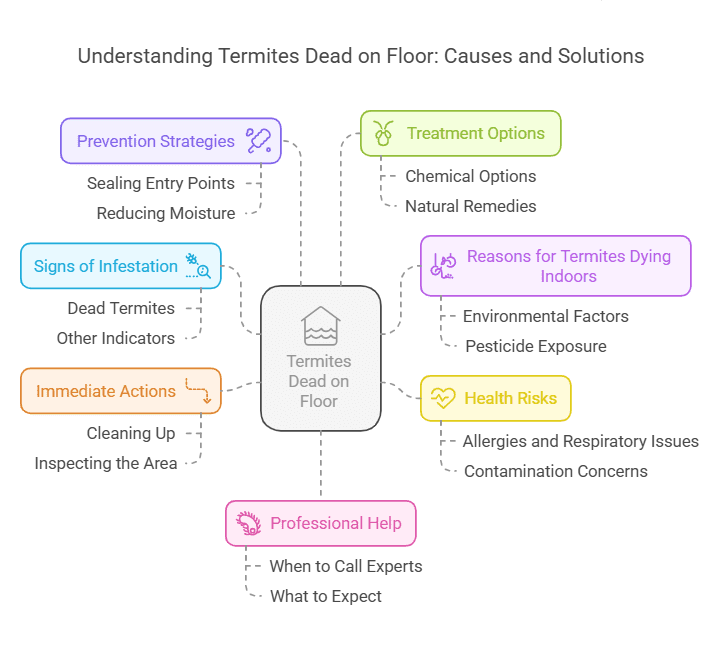
Health Risks Of Dead Termites
Dead termites on the floor can pose health risks. Their remains can attract mold and dust mites, triggering allergies. Pet owners should be cautious, as pets may ingest them, leading to potential digestive issues.
Hey friends, today we’re talking about something you might not think about often—dead termites on the floor. You might think, “What’s the big deal? They’re just bugs.” But, believe it or not, these little critters can pose some health risks. Let’s dive into it.
Allergies And Respiratory Issues
Termites, even when dead, can affect your health. If you’re sensitive to dust and allergens, dead termites can make things worse. Their bodies can break down into tiny particles that mix with the dust in your home. This can trigger allergies or make existing respiratory issues, like asthma, worse.
Think about this: You walk into a room, and suddenly, you start sneezing or coughing. The likely culprit? Those tiny termite particles floating around. So, it’s not just about keeping your home clean; it’s about keeping your air clean too.
Contamination Concerns
Now, let’s talk about contamination. Dead termites can attract other pests. Yes, you heard that right. Bugs like ants and other scavengers are drawn to these dead termites. And where there are bugs, there’s bacteria.
Why is this a problem? Because bacteria can spread, leading to contamination of surfaces in your home. Imagine preparing food on a counter that’s been a playground for bacteria. Not a pleasant thought, right?
Here are some tips to avoid this:
- Regularly clean your floors.
- Vacuum carpets and rugs to remove dead termites.
- Inspect your home for termite infestations.
Taking these steps can help you keep your home safe and healthy.
Conclusion
So, the next time you see dead termites on the floor, don’t just sweep them away and forget about it. Remember the health risks they pose. Clean up thoroughly, and keep your living space safe for you and your family.
Stay safe, friends!
Immediate Actions To Take
Finding termites dead on the floor can be alarming. These pests can damage your home. Immediate actions are crucial. This section will guide you on what to do next.
Cleaning Up
Start by cleaning up the dead termites. Use a vacuum cleaner to remove them. Dispose of the vacuum bag in an outdoor trash bin. This prevents any remaining termites from spreading. Wipe the area with a disinfectant. This removes any germs left behind.
Inspecting The Area
Inspect the area where you found the termites. Look for signs of more termites. Check for mud tubes and damaged wood. Pay attention to damp areas. Termites are often attracted to moisture. Use a flashlight to see clearly in dark spaces. Note any suspicious spots for further investigation.
Preventing Future Infestations
Finding termites dead on the floor is a clear sign of an infestation. Stopping future infestations requires taking proactive steps. These measures will help keep your home termite-free.
Sealing Entry Points
Termites enter through tiny cracks and crevices. Inspect your home for gaps in walls, floors, and foundations. Seal these entry points using caulk or other sealants. Pay special attention to areas where pipes and wires enter your home. Keeping these areas sealed prevents termites from finding a way in.
Reducing Moisture
Termites thrive in moist environments. Fix any leaks in your plumbing. Ensure your gutters and downspouts are working properly. Keep your home’s foundation dry by directing water away from it. Use dehumidifiers in damp areas like basements and crawl spaces. Reducing moisture makes your home less inviting to termites.

Credit: extension.msstate.edu
Effective Termite Treatments
Termites are a common problem. Finding them dead on your floor can be alarming. But the good news? There are effective ways to get rid of them. Let’s explore some of the best treatments available.
Chemical Options
Chemical treatments are often the first line of defense. They are strong and can quickly kill termites. Here are some common chemical options:
- Termiticides: These are special chemicals that kill termites. They come in liquid form and are applied to the soil around your home. This creates a barrier that termites cannot cross.
- Bait systems: Bait stations are placed around your home. Termites eat the bait and carry it back to their colony, killing many termites at once.
- Wood treatments: These treatments are applied directly to wood. They prevent termites from eating the wood and can kill those that try.
Using chemical options can be very effective. However, they must be used correctly. Always follow the instructions. And consider hiring a professional for the best results.
Natural Remedies
Not a fan of chemicals? No problem. There are natural ways to deal with termites too. They can be safer for your family and pets. Here are some easy natural remedies:
- Borax: Mix borax with water and spray it on the affected areas. It is a natural pesticide and can kill termites.
- Orange oil: Apply orange oil to the wood. Termites eat the oil and die. Plus, it leaves your home smelling fresh!
- Neem oil: Neem oil works slowly but surely. Termites ingest it and it disrupts their growth and reproduction.
Natural remedies can take longer to work. But they can be a good choice for small infestations. And they’re better for the environment.
In my experience, combining both methods can be the best approach. I once had a termite problem in my garage. I used bait stations along with orange oil. The result? No more termites. So, try out what works best for you. And remember, persistence is key.
Professional Pest Control
Discovering termites dead on the floor can be alarming. It signals a deeper problem that requires attention. Professional pest control services can help address this issue efficiently. They provide expert solutions to eliminate termites and prevent future infestations.
When To Call Experts
Spotting dead termites means there may be a larger infestation nearby. Call professionals if you notice signs like damaged wood, mud tubes, or discarded wings. Don’t wait for the problem to worsen. Early intervention can save your home from extensive damage.
What To Expect
Expect thorough inspections when professionals arrive. They assess the extent of the infestation and identify entry points. They use safe and effective treatments to eradicate termites. The process may include baiting systems, liquid treatments, or fumigation.
Professionals also provide advice on preventing future infestations. They may suggest regular inspections or specific home maintenance tips. Trusting experts ensures a comprehensive solution to your termite problem.
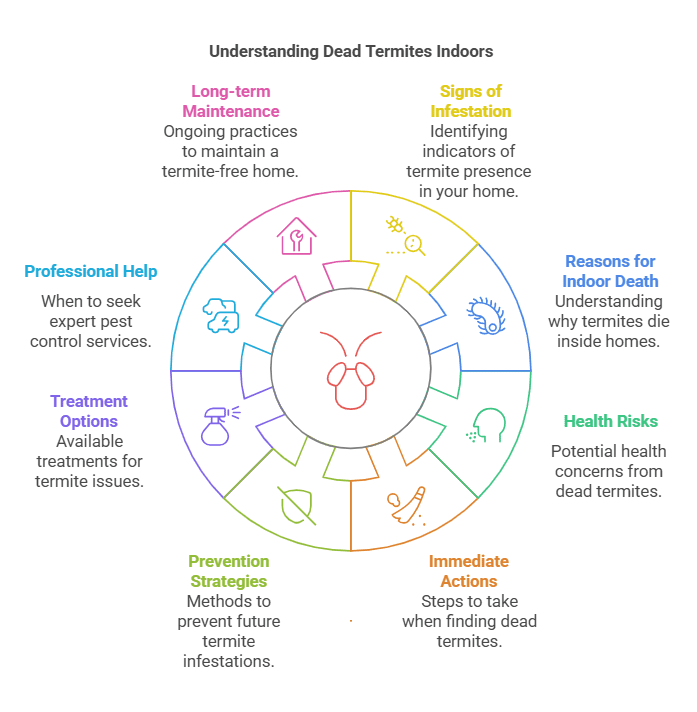
Long-term Maintenance Tips
Keeping your home free from termites requires constant effort. It’s not just about dealing with the immediate problem, but also about making sure it doesn’t happen again. Here are some long-term maintenance tips to help you keep termites at bay.
Regular Inspections
First things first, regular inspections are key. Think of it like a health check-up for your house. You wouldn’t skip your annual doctor visit, would you? Well, your home needs the same kind of attention. Here’s why:
- Detect problems early: Catching termite activity early can save you a lot of trouble and money.
- Peace of mind: Regular inspections keep you informed and stress-free.
So, how often should you inspect? Every six months is a good rule of thumb. And don’t worry, you don’t have to do it alone. Professional pest inspectors know exactly what to look for.
Home Repairs And Upkeep
Next up is home repairs and upkeep. Your home is like a living being. It needs care and attention to stay healthy. Neglecting small issues can lead to big problems. Let’s break it down:
- Fix leaks promptly: Moisture attracts termites. So, repair any leaks in your roof, pipes, or basement as soon as you spot them.
- Maintain your woodwork: Termites love wood. Make sure your wooden structures are in good condition. Paint and seal them to keep them safe.
- Clear debris: Don’t let leaves, wood, or other debris pile up near your home. These can become termite hotspots.
Remember, a stitch in time saves nine. Small repairs now can prevent major headaches later.
In conclusion, keeping your home termite-free is a continuous process. Regular inspections and timely repairs go a long way. Stay vigilant, and your home will thank you.
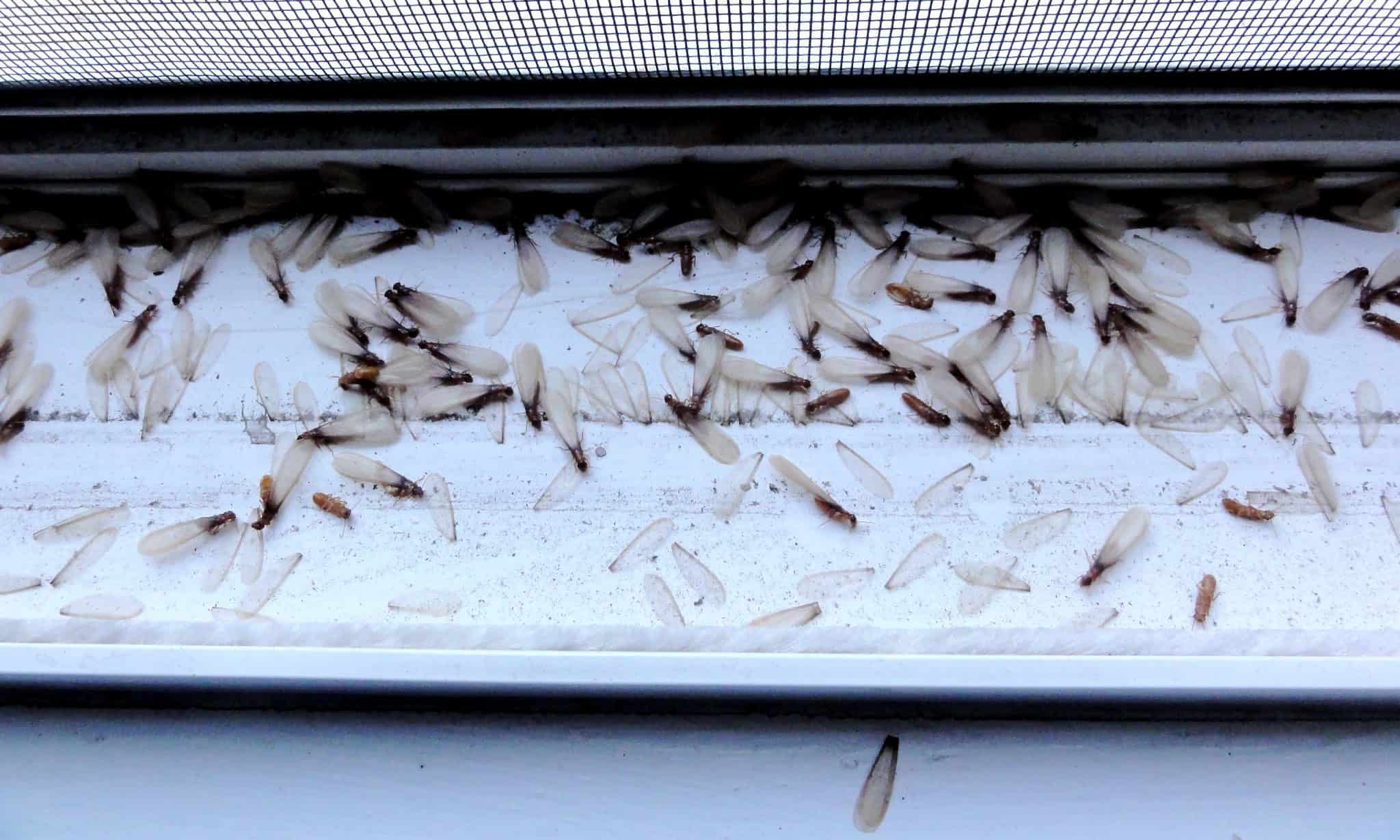
Credit: safeguardpestcontrol.com.au
Frequently Asked Questions
Is It Normal To Find Dead Termites?
Yes, it is normal to find dead termites. They often die off naturally or due to treatment.
How Do I Know If My Termite Infestation Is Bad?
Signs of a severe termite infestation include hollow-sounding wood, visible tunnels, discarded wings, and droppings. Contact a professional for an accurate assessment.
Why Are Termites On My Floor?
Termites on your floor indicate a possible infestation. They seek wood and moisture, often from leaks or damp areas.
Is It Normal To See A Few Termites?
Seeing a few termites is not normal. It usually indicates a potential infestation. Consult a pest control professional immediately.
Conclusion
Finding termites dead on the floor? It’s a clear warning sign. Act quickly to avoid damage. Regular inspections can save your home. Prevent future infestations by keeping areas dry and clean. Use professional help when needed. Don’t ignore the problem.
Termites can cause serious harm. Protect your property by staying vigilant. Keep your home safe and termite-free.

